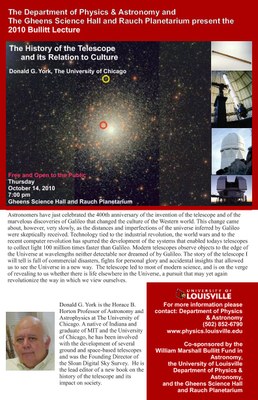Bullitt Lecture in Astronomy 2010 - The History of the Telescope and its Relation to Culture
| When |
Oct 14, 2010
from 07:00 PM to 08:00 PM |
|---|---|
| Where | Gheens Science Hall & Rauch Planetarium |
| Add event to calendar |
|
The Physics & Astronomy Department’s Bullitt Lecture is a free lecture aimed at the general public. Since 2001, the Physics & Astronomy Department’s Bullitt Lecture has presented a distinguished astrophysicist to a Louisville audience in the Gheens Science Hall and Rauch Planetarium. Gale Christianson, Hubble's biographer at Indiana State, Fred Espenak, an eclipse expert at NASA Goddard Space Flight Center, stellar astrophysicists James Kaler of U. Illinois, C. R. O'Dell of Vanderbilt and Caty Pilachowski of Indiana U, cosmologists Fang Li Zhi of Arizona, J. Richard Gott of Princeton, Alan Dressler of the Carnegie Observatories and lunar experts Ferenc Pavlics of GM and the Apollo project and Phillip Abel of NASA have been Bullitt Lecturers. College and high school students, teachers, and many others from the community interested in the impact and excitement that astrophysics has generated have attended Bullitt Lectures in large numbers. The public and members of the University community are warmly invited!
The Lecture is endowed through a grant from the family of William Marshall Bullitt, the Solicitor General of the United States under President William Howard Taft. Here is a brief biography and description of his connection to the University of Louisville.
Speaker: Donal G. York, University of Chicago
 Abstract: Astronomers have just celebrated the 400th anniversary of the invention of the telescope and of the marvelous discoveries of Galileo that changed the culture of the Western World. This change came about, however, very slowly, as the distances and imperfections of the universe inferred by Galileo were skeptically received. Technology tied to the industrial revolution, the work wars and to the recent computer revolution has spurred the development of the systems that enable todays telescopes to collect light 100 million times faster than Galileo. Modern telescopes observe objects to the edge of the Universe at wavelengths neither detectable nor dreamed of by Galileo. The story of the telescope I will tell is full of commercial disasters, fights for personal glory and accidental insights that allowed us to see the Universe in a new way. The telescope led to most of modern science, and is on the verge of revealing to us weather ther is life elsewhere in the Universe, a pursuit that may yet again revolutionize the way in which we view ourselves.
Abstract: Astronomers have just celebrated the 400th anniversary of the invention of the telescope and of the marvelous discoveries of Galileo that changed the culture of the Western World. This change came about, however, very slowly, as the distances and imperfections of the universe inferred by Galileo were skeptically received. Technology tied to the industrial revolution, the work wars and to the recent computer revolution has spurred the development of the systems that enable todays telescopes to collect light 100 million times faster than Galileo. Modern telescopes observe objects to the edge of the Universe at wavelengths neither detectable nor dreamed of by Galileo. The story of the telescope I will tell is full of commercial disasters, fights for personal glory and accidental insights that allowed us to see the Universe in a new way. The telescope led to most of modern science, and is on the verge of revealing to us weather ther is life elsewhere in the Universe, a pursuit that may yet again revolutionize the way in which we view ourselves.
Donal G. York is the Horace B. Horton Professor of Astronomy and Astrophysics at the University of Chicago. A native of Indiana and graduate of MIT and the University of Chicago, he has been involved with the development of several ground and space-based telescopes and was Founding Director of the Sloan Digital Sky Survey. He is the lead editor of a new book on the history of the telescope and its impact on society.
